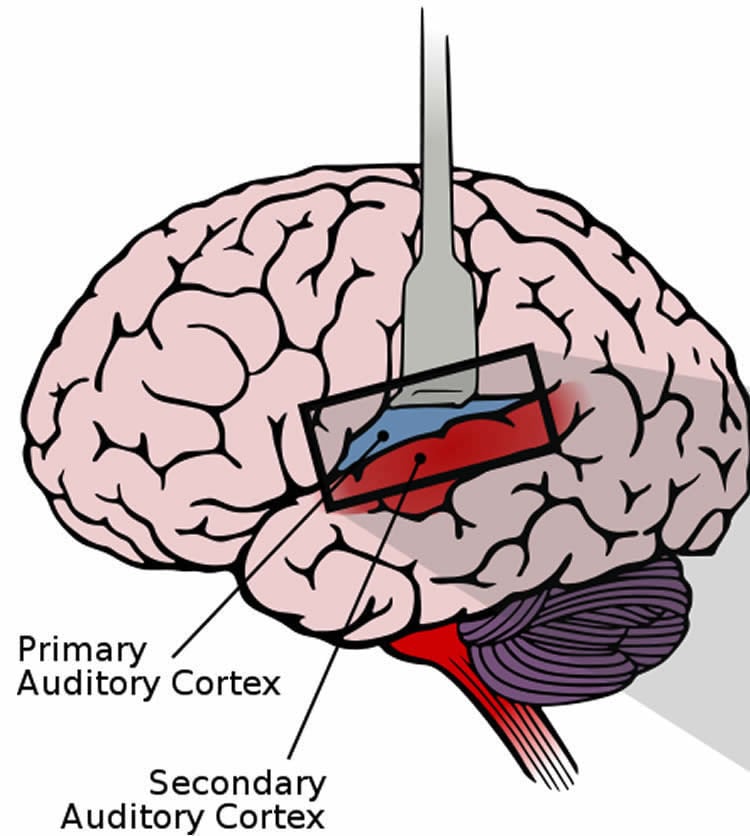Summary: Noticeable communication problems may be an early sign of mild cognitive impairment, a new study reports.
Source: Baycrest Center For Geriatric Care.
Early dementia is typically associated with memory and thinking problems; but older adults should also be vigilant about hearing and communication problems, suggest recent findings in a joint Baycrest-University of Memphis study.
Within older adults who scored below the normal benchmark on a dementia screening test, but have no noticeable communication problems, scientists have discovered a new potential predictor of early dementia through abnormal functionality in regions of the brain that process speech (the brainstem and auditory cortex).
These brain regions are thought to be more resilient to Alzheimer’s. However, this discovery demonstrates changes occur early in the brain’s conversion of speech sound into understandable words. This finding could be the first sign of decline in brain function related to communication that presents itself before individuals become aware of these problems.
Their research technique of measuring electrical brain activity using an electroencephalogram (EEG) in these brain regions also predicted mild cognitive impairment (MCI), a condition that is likely to develop into Alzheimer’s, with 80 per cent accuracy. This test could be developed into a cost-effective and objective diagnostic assessment for older adults.
The study, published online in the Journal of Neuroscience prior to print publication, looked at older adults with no known history of neurological or psychiatric illnesses with similar hearing acuity.
The brain activity within the brainstem of these older adults demonstrated abnormally large speech sound processing within seven to 10 milliseconds of the signal hitting the ear, which could be a sign of greater communication problems in the future.
“This opens a new door in identifying biological markers for dementia since we might consider using the brain’s processing of speech sounds as a new way to detect the disease earlier,” says Dr. Claude Alain, the study’s senior author and senior scientist at Baycrest’s Rotman Research Institute (RRI) and professor at the University of Toronto’s psychology department.
“Losing the ability to communicate is devastating and this finding could lead to the development of targeted treatments or interventions to maintain this capability and slow progression of the disease.”
The study involved 23 older adults between the ages of 52 and 86. Participants were separated into two groups based on their results on a dementia screening test, the Montreal Cognitive Assessment (MoCA). Researchers measured brain activity in the brainstem while participants were watching a video. They measured brain activity in the auditory cortex while participants were identifying vowel sounds. Statistical methods were used to combine both sets of brain activity to predict MCI.
“When we hear a sound, the normal aging brain keeps the sound in check during processing, but those with MCI have lost this inhibition and it was as if the flood gates were open since their neural response to the same sounds were over-exaggerated,” says Dr. Gavin Bidelman, first author on the study, a former RRI post-doctoral fellow and assistant professor at the University of Memphis. “This functional biomarker could help identify people who should be monitored more closely for their risk of developing dementia.”
The next steps involve studying whether those individuals who already have dementia or convert early from MCI to dementia also demonstrate these same changes in brain activity when they hear speech.
Research for this study was conducted with support from the Grammy Foundation, the Canadian Institutes of Health Research, the FedEx Institute of Technology and the Center for Technologies and Research in Alzheimer’s Care, which supported the staff and equipment needed to conduct the study.

With additional funds, researchers could explore developing a portable, reliable and easy-to-use alternate diagnostic test for MCI that incorporates the body’s different senses.
“MCI is known to cause changes in different senses, such as vision or touch,” says Dr. Alain. “If we could incorporate these changes into a wireless EEG test, we could combine all this information and develop a better biomarker. One day, doctors could administer a short, 10-minute assessment and instantly provide results.”
“This could offer a new diagnostic assessment that tests a person’s cognitive abilities, such as their ability to communicate, and objectively measure physiological changes in the brain that reflect early signs of dementia,” says Dr. Bidelman.
The research team included Jill Lowther (University of Memphis) and Sunghee Tak (Seoul National University).
Funding: Funding for this research was provided by Grammy Foundation, Canadian Institutes of Health Research, FedEx Institute of Technology, Center for Technologies and Research in Alzheimer’s Care.
Source: Scott LaFee – Baycrest Center For Geriatric Care
Image Source: NeuroscienceNews.com image is in the public domain.
Original Research: Abstract for “Mild cognitive impairment is characterized by deficient brainstem and cortical representations of speech” by Gavin M. Bidelman, Jill E. Lowther, Sunghee H. Tak and Claude Alain in Journal of Neuroscience. Published online March 7 2017 doi:10.1523/JNEUROSCI.3700-16.2017
[cbtabs][cbtab title=”MLA”]Baycrest Center For Geriatric Care “The Way The Brain Processes Speech Could Serve as a Predictor of Early Dementia.” NeuroscienceNews. NeuroscienceNews, 15 March 2017.
<https://neurosciencenews.com/neurotheology, epilepsy-religion-62115/>.[/cbtab][cbtab title=”APA”]Baycrest Center For Geriatric Care (2017, March 15). The Way The Brain Processes Speech Could Serve as a Predictor of Early Dementia. NeuroscienceNew. Retrieved March 15, 2017 from https://neurosciencenews.com/neurotheology, epilepsy-religion-62115/[/cbtab][cbtab title=”Chicago”]Baycrest Center For Geriatric Care “The Way The Brain Processes Speech Could Serve as a Predictor of Early Dementia.” https://neurosciencenews.com/neurotheology, epilepsy-religion-62115/ (accessed March 15, 2017).[/cbtab][/cbtabs]
Abstract
Mild cognitive impairment is characterized by deficient brainstem and cortical representations of speech
Mild cognitive impairment (MCI) is recognized as a transitional phase in the progression toward more severe forms of dementia and is an early precursor to Alzheimer’s disease. Previous neuroimaging studies reveal MCI is associated with aberrant sensory-perceptual processing in cortical brain regions subserving auditory and language function. However, whether the pathophysiology of MCI extends to speech processing prior to conscious awareness (brainstem) is unknown. Using a novel electrophysiological approach, we recorded both brainstem and cortical speech-evoked brain potentials (ERPs) in older, hearing-matched human listeners who did and did not present with subtle cognitive impairment revealed through behavioral neuropsychological testing. We found MCI was associated with changes in neural speech processing, characterized as hypersensitivity (larger) brainstem and cortical speech encoding in MCI compared to controls in the absence of any perceptual speech deficits. Group differences also interacted with age differentially across the auditory pathway; brainstem responses became larger and cortical ERPs smaller with advancing age. Multivariate classification revealed that dual brainstem-cortical speech activity correctly identified MCI listeners with 80% accuracy, suggesting application as a biomarker of early cognitive decline. Brainstem responses were also a more robust predictor of individuals’ MCI severity than cortical activity. Our findings (i) suggest that MCI is associated with poorer encoding and transfer of speech signals between functional levels of the auditory system and (ii) advance the pathophysiological understanding of cognitive aging by identifying subcortical deficits in auditory sensory processing mere milliseconds (<10-ms) after sound onset and prior to the emergence of perceptual speech deficits.
SIGNIFICANCE STATEMENT
Mild cognitive impairment (MCI) is a precursor to dementia marked by declines in communication skills. Whether MCI pathophysiology extends below cerebral cortex to impact speech processing prior to conscious awareness (brainstem) is unknown. By recording neuroelectric brain activity to speech from brainstem and cortex, we show that MCI hypersensitizes the normal encoding of speech information across the hearing brain. Deficient neural responses to speech (particularly those generated from the brainstem) predicted the presence of MCI with high accuracy and prior to behavioral deficits. Our findings advance the neurological understanding of MCI by newly identifying a subcortical biomarker in auditory-sensory processing prior to conscious awareness, which may be precursor to declines in speech understanding.
“Mild cognitive impairment is characterized by deficient brainstem and cortical representations of speech” by Gavin M. Bidelman, Jill E. Lowther, Sunghee H. Tak and Claude Alain in Journal of Neuroscience. Published online March 7 2017 doi:10.1523/JNEUROSCI.3700-16.2017







